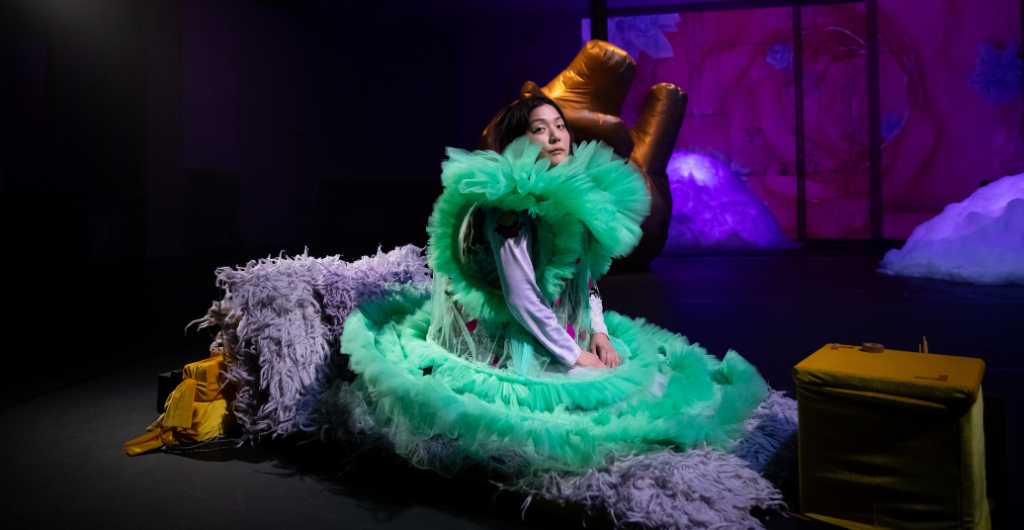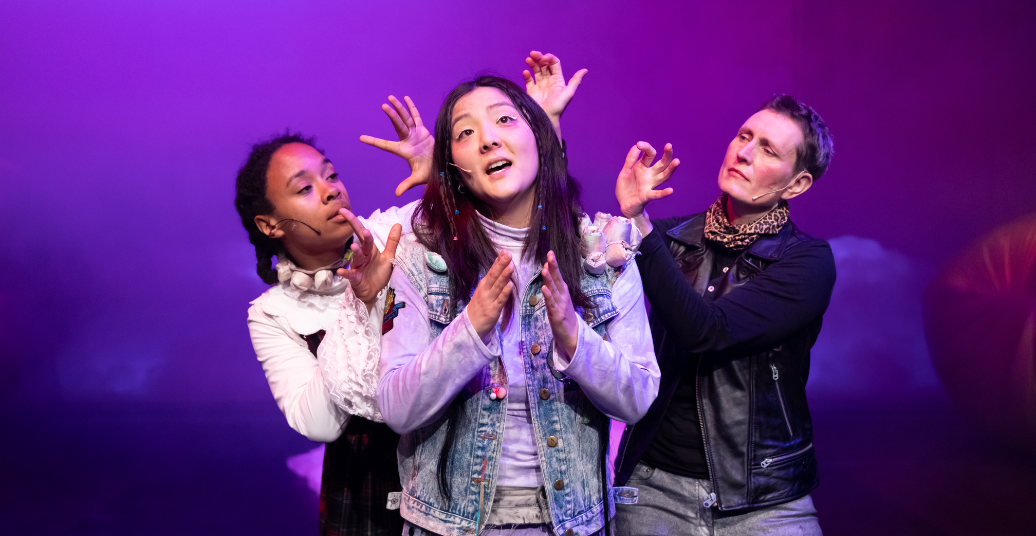The stand-up comedy Baby I’m Sick Tonight will make you laugh and cry. Ahead of the premiere (April 25, 2024, Sophiensaele), I spoke with the choreographer Olivia Hyunsin Kim about chronic illness and the shortcomings when it comes to dealing with it.
Being sick is a lonely affair. While I’m typing this article on my keyboard, my flatmate has been in bed for 14 days with a stubborn case of bronchitis and dreadful coughing fits. Sometimes she gets up and we eat together. On Tuesday, she dragged herself across the street to the kiosk to buy a lottery ticket for the EuroMillions. That day there was something we could be feverish about together. However, she usually says she would rather not see anyone. She is cranky and not a good conversation partner.
Illness is a lonely affair. Because the exhaustion we feel, the suffering in our own body, indeed its malfunctioning, make us useless for a shared daily life in a world that revolves around work, performance, and success. We are alone with the pain that we feel since it has no external cause, but is rather arising from the mysterious goings-on in our own broken body. Is that the case? I believe Olivia Hyunsin Kim’s amazing performance reveals two different things: the anatomy or inner logic of a chronic illness, but also those external factors in public and private life, in the healthcare system and routine workday, which not only fail to ease the suffering of sick people, but actually significantly exacerbate it.
This is the case for Sara, a “fake character” whose story Hyunsin pieces together from the fates of 200 patients at the Yale Fertility Clinic. Sara, who died of cancer as a result of a delayed endometriosis diagnosis, was advised to freeze her eggs. After a grueling hormone therapy treatment, she goes to the clinic for the egg extraction. The procedure causes excruciating pain. However, the doctors show little concern. They are instead perplexed and ultimately ask her, almost insulted, whether or not she would like to stop the procedure. Sara suffers through. Only months later does it come to light that she was merely given a saline solution instead of the strong pain medication fentanyl.
Sara’s case is representative of a shameful statistic, which attests to the fact that women are more frequently misdiagnosed, less well treated, and simply not taken seriously in comparison to men. As Dr. Kim, Hyunsin performs a musical-esque waiting room scene showing us how it happens: asked to rate their pain on a scale from 1 to 10, Kim’s patients (Jill B. Suffner and Yvonne Sembene) lament loud and clear that it is over 10, to which Dr. Kim responds with arched eyebrows, “so let’s say 7”. When the hysterical choir of patients confesses through song to attempting a Google self-diagnosis, Dr. Kim throws both out of the office.
The appalling stories that I hear from Hyunsin’s childhood, from historical reports about hysteria patients at the Parisian Psychiatrie La Salpêtrière, and from current everyday accounts of chronically sick people sometimes turn my stomach. Even though the scalpel sharp humor of this stand-up comedy simultaneously makes me laugh at the top of my lungs. Although I remain, as a member of the audience I feel better that we were informed we could leave and return at any time at the beginning of the piece. As a “relaxed performance”, this is also an event that I don’t have to remain in my seat for. This announcement, in addition to a row of soft bean bag chairs for people who can not sit comfortably in chairs and the live translation of all four performances in German Sign Language (DGS) (Hyemi Jolee and Aniella Tiedje), is one of the many measures taken to make the piece more accessible to a diverse audience.

©Mayra Wallraff
However, implementing these measures is often the responsibility of artists themselves, Hyunsin related during our conversation a few days before the premiere. In her opinion, institutions should be more actively involved in the organization and financing of access measures concerning the audience. However, things are even worse for the artists themselves. Since the Covid pandemic there has been talk of a cancellation fee in the independent theater and dance scene. But there is still no satisfactory and binding concept. The same goes for the so-called access rider (a document in which any special needs and limitations of the artists are communicated to theater and other institutions), which remains a complex issue. “Who would dare submit such a document?” Hyunsin asks. She herself never has. The fear of any demands creating a roadblock to working together is too great.
That last example makes it especially clear what Hyunsin is referring to both in our discussion and in her piece. Not all illnesses are alike. Like hell anyone who is not (yet) a superstar on the scene or is already experiencing discrimination on the basis of e.g. skin color, nationality, or classism will out themselves as a Spoonie[1] and potentially risk a gig – or socially exclude themselves even more.
And so the circle is closed and I return to the loneliness of illness, which Olivia Hyunsin Kim and her team confront in a radiant and encouraging gesture through shameless openness, humor, and a musical collective in Baby I’m Sick Tonight.
English translation by Melissa Maldonado
[1] Spoonie is a self-imposed term used by chronically ill people, which was derived from Christine Miserandino’s Spoon Theory formulated in 2003. With the help of spoons, the Spoon Theory illustrates how, compared to healthy individuals, the chronically ill only have a limited amount of available energy that they have to budget every day.
Baby I’m Sick Tonight by Olivia Hyunsin Kim premiered on April 25, 2024 at Sophiensaele.




